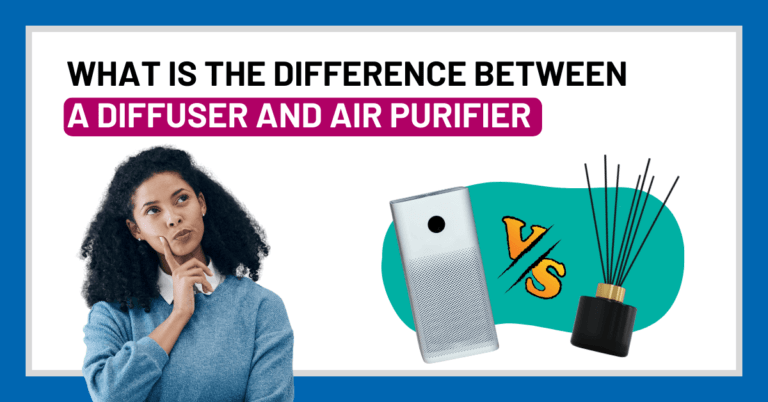Your cart is currently empty!

What Is the Difference Between a Diffuser and an Air Purifier?
by Karl von Luckwald / January 16, 2024
Both essential oil diffusers and air purifiers are popular in homes for improving air quality, but they serve a different function
This article will reveal their purposes, functionalities, and key differences to understand when and why you should use each.
What Is the Difference Between a Diffuser and an Air Purifier?
Diffusers add pleasant scents and moisture to the air using essential oils but can release harmful compounds. Air purifiers, conversely, filter out pollutants like dust and smoke, improving air quality. Combining both can enhance indoor air with soothing aromas while ensuring it remains clean and healthy.
What are Essential Oil Diffusers?
Functionality
Diffusers are used to disperse natural aromas, typically from essential oils, into the air. They work by breaking down the oil into fine particles and releasing them into the air, often adding a pleasant scent and humidity.

Types
There are several types of diffusers, including ultrasonic, nebulizing, heat, and evaporative diffusers. Each type uses a different method to disperse essential oils into the air.
Benefits
The primary benefit of diffusers is to create a soothing and aromatic environment. They can help in relaxation, and mood enhancement, and sometimes provide minor health benefits, like easing respiratory discomfort.

Risks
As of 2023, essential oils are not regulated by the FDA. This means there’s no requirement to list their ingredients, so consumers often don’t know exactly what’s in them.
Furthermore, Australian researchers tested over 20 essential oils and discovered they released 33 potentially dangerous volatile organic compounds (VOCs).
These chemicals can irritate the eyes, nose, and throat, headaches, coordination problems, nausea, and could harm the liver, kidneys, or nervous system.

What Are Air Purifiers?
Functionality
Air purifiers clean the air by trapping pollutants such as dust, pollen, smoke, and harmful microorganisms. They use filters, most commonly HEPA and activated carbon, to capture these contaminants.

Types
There are various types of air purifiers, including HEPA filters, activated carbon filters, UV light purifiers, and ionic purifiers. The most common type of air purifier works with HEPA and carbon filters. Both provide comprehensive protection from indoor air pollution.

Benefits
The main benefit of air purifiers is improved air quality. They particularly help people with allergies, asthma, or other respiratory issues. People living in highly polluted areas should consider air purifiers as well.
Air cleaners using Carbon filters can also reduce odors and smoke, making the air fresher and healthier to breathe.
Our picks: The best air purifiers in Thailand
How Do Diffusers and Air Purifiers Differ?
Diffusers primarily add fragrance or moisture to the air, while air purifiers focus on cleaning the air by removing pollutants.
Health Impact
Diffusers can enhance mood and provide some respiratory relief through aromatherapy. Air purifiers, however, have a more direct impact on health by removing harmful particles from the air.
Components and Operation
Diffusers typically use essential oils and various methods to disperse them into the air. In contrast, air purifiers rely on filters to clean the air.
Maintenance
Diffusers require regular cleaning and refilling of oils. Air purifiers need filter replacements and occasional cleaning.

Price
Diffusers are generally more affordable than air purifiers. While some high-end diffusers can be pricey, they are typically less expensive than most air purifiers.
Both devices have ongoing costs, such as essential oils for diffusers and filter replacements for air purifiers. It’s important to consider these costs when deciding between the two.
Combining Diffusers and Air Purifiers
While diffusers enhance the air with calming fragrances, they may also release volatile organic compounds (VOCs) that could be unhealthy. Air purifiers with activated carbon filters are effective at absorbing these VOCs.
For this reason, it’s a good idea to use diffusers and air purifiers together to breathe both aromatic and clean air.
Read more: How to choose the right air purifier?
Bottom Line
Diffusers and air purifiers both improve air quality but in different ways: diffusers add fragrance and moisture while air purifiers remove harmful particles. Understanding their functions, benefits, and risks helps choose the right device for your home.
FAQ

Karl von Luckwald
Since moving to Thailand in 2019, Karl noticed the lack of scientific integrity in air purifier and water filter reviews. In response, he founded WE DO AIR to champion unbiased, science-based evaluations and empower consumers to make better-informed decisions.

